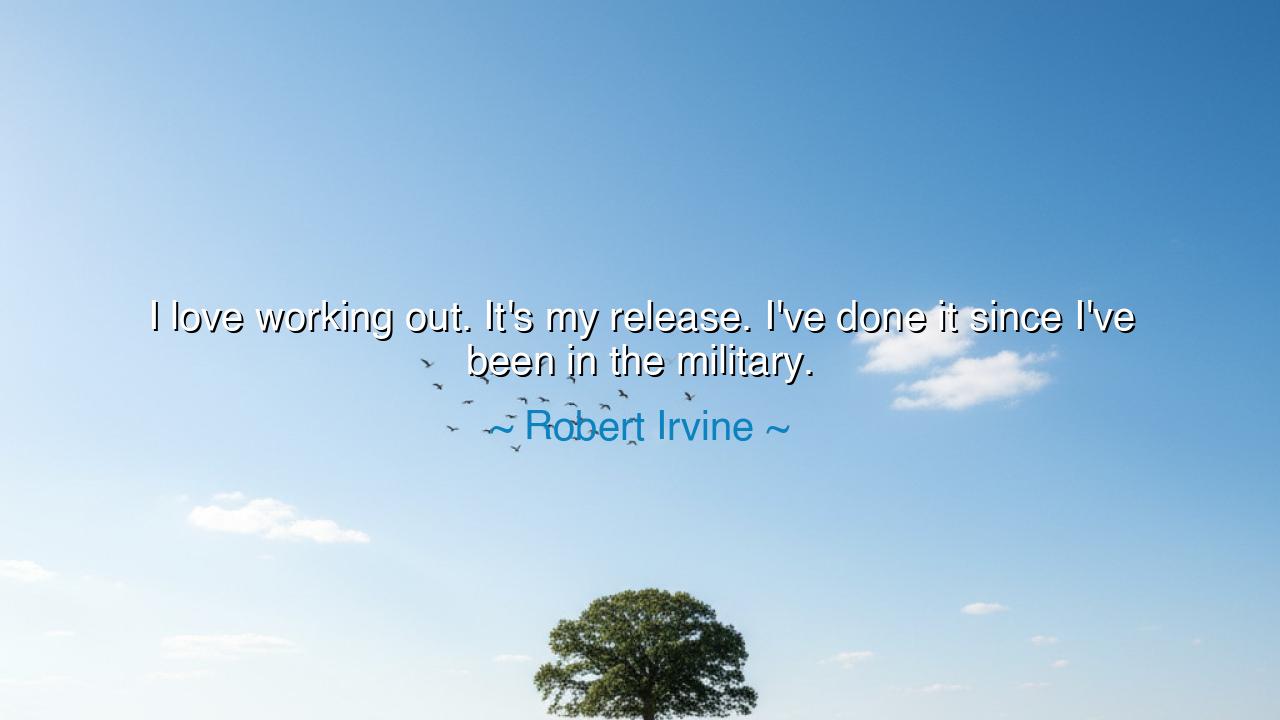
I love working out. It's my release. I've done it since I've been






The words of Robert Irvine, “I love working out. It's my release. I've done it since I've been in the military,” are more than a declaration of fitness—they are a hymn to discipline, resilience, and renewal. Beneath their simplicity lies the timeless truth that strength of the body is the foundation of strength of spirit. To Irvine, the act of working out is not a mere routine, but a ritual—a sacred space where chaos is subdued, burdens are lifted, and clarity is reborn. It is the release through which pain is transformed into purpose and struggle into peace.
The origin of this quote reaches back to Irvine’s formative years in the British Royal Navy, where the rhythms of duty forged in him a deep respect for structure and endurance. In the military, the body is not trained for vanity but for survival, for service, for mastery over fear. Every repetition, every mile, every drop of sweat becomes a dialogue between will and limitation. It was there, amidst the rigor of command and the weight of responsibility, that Irvine discovered that physical exertion was not punishment, but purification—a way to steady the mind and awaken courage. His lifelong devotion to fitness springs from that revelation: that discipline, applied through the body, can liberate the soul.
To “love working out” is to embrace the sacred art of struggle. The iron, the sweat, the burning lungs—these are not enemies, but teachers. They remind us that growth is born from discomfort, that transformation demands effort. The gym, like the battlefield or the monastery, is a place where the individual confronts himself. There, the weak man dies, and the strong one is reborn—not in pride, but in perseverance. Irvine’s “release” is not escape, but expression. Through movement, he releases fear, frustration, and fatigue, transmuting them into energy, clarity, and peace.
History, too, honors those who found strength and serenity through physical discipline. The ancient Spartans, for instance, trained not merely for war, but for the perfection of the self. Their daily exertions were an act of reverence—a way to honor the divine order through mastery of the body. Similarly, the Japanese samurai combined swordsmanship with meditation, understanding that strength and serenity are twins of the same spirit. Irvine stands in this ancient lineage, his gym the modern temple where he honors the eternal balance between body and mind, between control and release.
This philosophy reveals a powerful paradox: that through discipline, one finds freedom. The untrained body is a prison; the restless mind is a storm. But through the act of focused movement—whether lifting, running, or breathing—one reclaims sovereignty over the self. Irvine’s “release” is therefore not indulgence, but liberation. It is the shedding of chaos through effort, the quieting of noise through rhythm. The sweat that falls from the brow is not wasted; it is the outward sign of inner cleansing. For every repetition builds more than muscle—it builds mastery over life itself.
In an age where many seek ease over effort and pleasure over purpose, Irvine’s words call us back to the ancient virtue of work. To “love working out” is to love process over result, to love the journey more than the destination. It is to understand that health is not a possession, but a practice. True strength, as Irvine embodies, is not measured by size or speed, but by consistency—the steadfast will to rise each day and meet oneself again upon the field of effort.
The lesson, then, is clear: treat your body as the vessel of your destiny. Train it not out of vanity, but out of reverence. Let every movement, every repetition, be a prayer of gratitude to the life that flows through you. Find your release in action, not escape—in striving, not in stillness. When the world’s burdens weigh upon you, turn to discipline, not despair; for the body that endures teaches the spirit to endure as well.
So let this truth be passed down as wisdom for the ages: strength is not built in comfort, nor peace found in passivity. The man who labors with purpose refines not just his flesh, but his soul. Like Irvine, let us learn to love the struggle that frees us, to cherish the labor that restores us, and to remember always that through the discipline of the body, the mind finds its calm, and the heart its courage.






AAdministratorAdministrator
Welcome, honored guests. Please leave a comment, we will respond soon